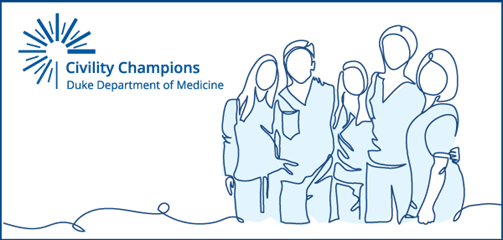
Sometimes we see or hear about things happening to our colleagues, co-workers, trainees and patients that we know are not right, that make us uncomfortable, that we know are harmful. And often we don't know what to do about it. Have you heard of someone being harmed by a microaggression...or worse? Have you wished you could do something to reduce the harm? Well, actually there is a way to learn skills for this - become a Civility Champion.
“When I first learned about the Civility Champions I thought it sounded like a good idea in general, and then when I had the opportunity to learn about restorative justice, nonviolent communication, and skillful ways to improve the culture without confrontation or shame, I wished everyone could become a Champion,” says professor of medicine, Jane Gagliardi, MD, MHS, Civility Champion debrief facilitator.
“The lessons I've learned from being a Civility Champion are helpful in every domain of my professional and personal life.” - Jane Gagliardi, MD, MHS, Civility Champion debrief facilitator
Caring for each other
When Dr. Laura Svetkey observes the Civility Champions debrief each quarter, under Jane Gagliardi's skillful facilitation, she sees in action the ways Duke colleagues truly care for each other.
“People sometimes mistreat each other, it's a fact, and the Civility Champions are there to hear the story, provide support, and access resources,” says Laura Svetkey, MD, MHS, vice chair for Faculty Development & Diversity in the Department of Medicine. “Perhaps most importantly, they are there to contribute every day to a just and inclusive work culture,"
Promoting a healthier work environment
Duke Civility Champions provide support, explore options for intervention or reporting when safe and appropriate, model the Department’s commitment to addressing the harm these incidents cause, and strengthen our community by working toward an environment of healing and care.
“Being a civility champion has provided me with the training to assist harmed individuals and promote restorative justice and appropriately direct team members to necessary available resources,” says Camille Frazier-Mills, MD, MHS, associate professor in the division of Cardiology. “I’ve also been fortunate to engage with others and recognize the level of commitment within Duke to promote an environment of mutual respect and intolerance to forms of aggressions.”
The Department of Medicine invites all interested faculty (including VA) and trainees to join the program. The next training opportunity will occur on two consecutive Tuesday mornings (April 18 and 25, 2023 from 7-10 a.m.) or two consecutive Thursday afternoons (April 20 and 27, 2023 from 2-5 p.m.).
Applications are due by Dec. 19, 2022. Apply Today.
Please contact Jane Gagliardi (jane.gagliardi@duke.edu) or Kim Dorman (kimberly.dorman@duke.edu) with questions.
All School of Medicine faculty are expected to uphold the highest standards for professional conduct and ethical behavior. The Department of Medicine now has a website on information related to professionalism. Resources are also available when there are concerns here.